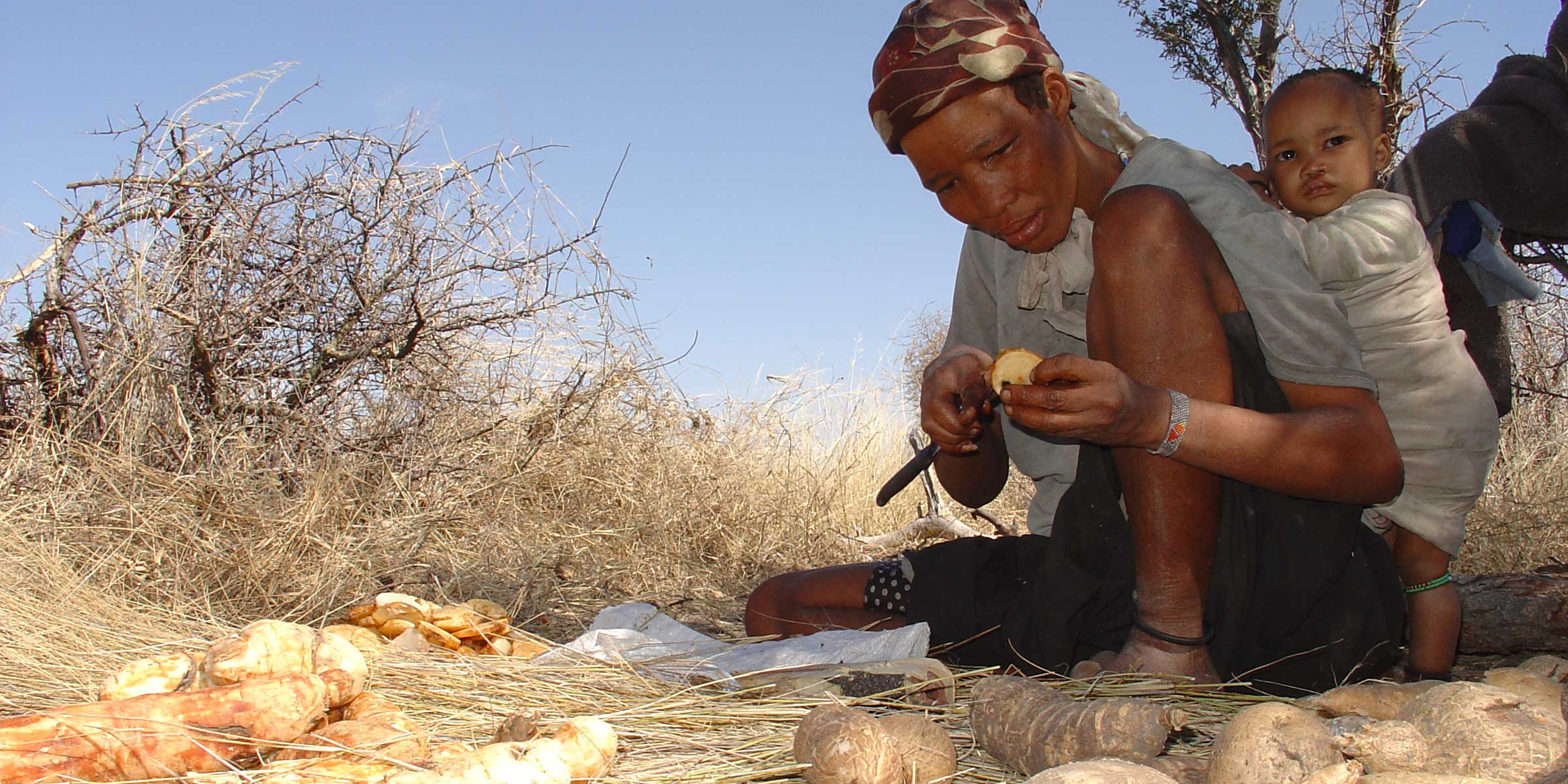Program Overview
MCC’s $295.7 million Namibia Compact (2009-2014) funded the $7.6 million Indigenous Natural Product (INP) Activity. The activity aimed to improve quality and increase quantity and sales of five native plant products used in health and beauty markets to ultimately increase harvesters’ income, the majority of whom are women. Sub-activities included training harvesters and the intermediaries who facilitate sales, as well as establishing an Innovation Fund and market information tool to improve competitiveness within the sector.
Evaluator Description
Millennium Challenge Account Namibia commissioned NORC to conduct an independent final performance evaluation of the Indigenous Natural Product Activity. Full report results and learning: https://data.mcc.gov/evaluations/index.php/catalog/152.
Key Findings
Improving Sector Competitiveness
- Qualitative reports indicate the sector was more organized following the activity’s holistic approach to coordinating across stakeholders.
- 60 Producer and Processor Organizations (PPOs)—intermediaries between harvesters and buyers—were trained, however PPO staff indicated the content was too complex.
Harvester Training and Practices
- Harvesters indicated on-demand technical assistance was more effective than classroom training and they applied what they learned as a result; however the technical assistance was less defined and measurable.
Quality, Quantity, and Sales of Products
- Training focused primarily on improving the quality of four native plant harvests.
- For Devil’s Claw, significant quality improvements were evident to interviewed private traders and European importers, and harvesters associated these improvements with higher prices.
- The predominantly women harvesters indicated the quantity harvested and sold increased for Marula only, and not for the three other native plants.
Household Income and Sustainability
- Some harvesters reported that women harvesters gained more control over household income with harvest income, while others reported that nothing changed.
- Training did not have a measurable impact on household income.
- One risk to sustainability was that PPOs remained dependent on external support and required continuous training due to staff turnover.
Evaluation Questions
This final performance evaluation was designed to answer if training and support:
- 1
Improved harvesting practices and operational capacity? - 2
Increased product quantity? - 3
Improved product quality? - 4
Increased product sales? - 5
Increased household incomes? - 6
Demonstrated sustainability? - 7
What was the perceived impact on houshold gender relationships?
In addition, because the majority of harvesters were women, the evaluation was designed to answer:
Detailed Findings
Improving Sector Competitiveness

Oil distillation facility in Opuwo.
Prior to the activity, the natural products sector was disorganized across stakeholders, and harvesters had limited awareness of sustainable harvesting techniques and buyers’ quality standards. Qualitative reports indicate the sector was more organized following the activity’s holistic approach to coordinating across stakeholders. However, while PPO organizational capacity improved, qualitative data suggested training content was too complex for the skill level of participants. The activity also supported the Opuwo Processing Facility, which produces essential oils and was fully operational at program end.
Harvester Training and Practices
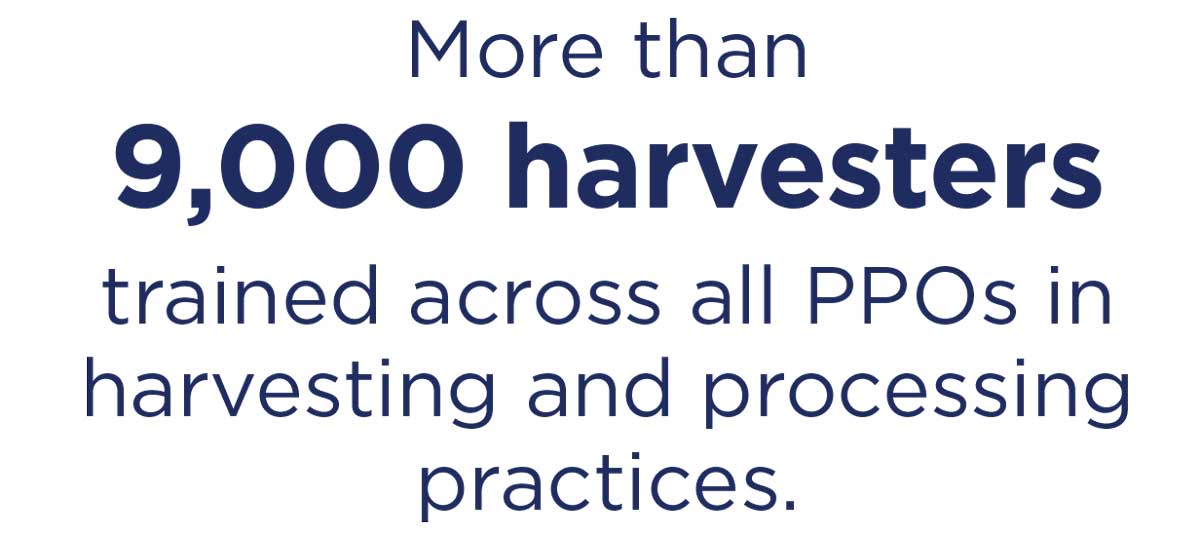
Before the activity, harvesters typically depended on traditional practices and tools. For example, the major bottleneck in the production of Marula products was the lack of adequate cracking tools for the seeds. The activity trained over 9,000 harvesters across all PPOs in harvesting and processing practices; harvesters universally reported applying their learning.
Based on qualitative and quantitative data, training is correlated with improved practice. For Commiphora, harvesters reported no longer mixing different types and prioritizing reddish samples because buyers place a higher value on them. For Marula, harvesters improved the hygienic practices with harvesting and preparing for processing. Qualitative data suggests the gender component of training was often unnecessary because harvesters were primarily women. These sessions turned to other topics such as reducing child labor. Following such discussions, PPOs involved in Devil’s Claw pledged that children would not be used to harvest that product. The activity is correlated with women having a stronger voice and participating more in decision-making, including increased involvement of women in PPO board and management activities.
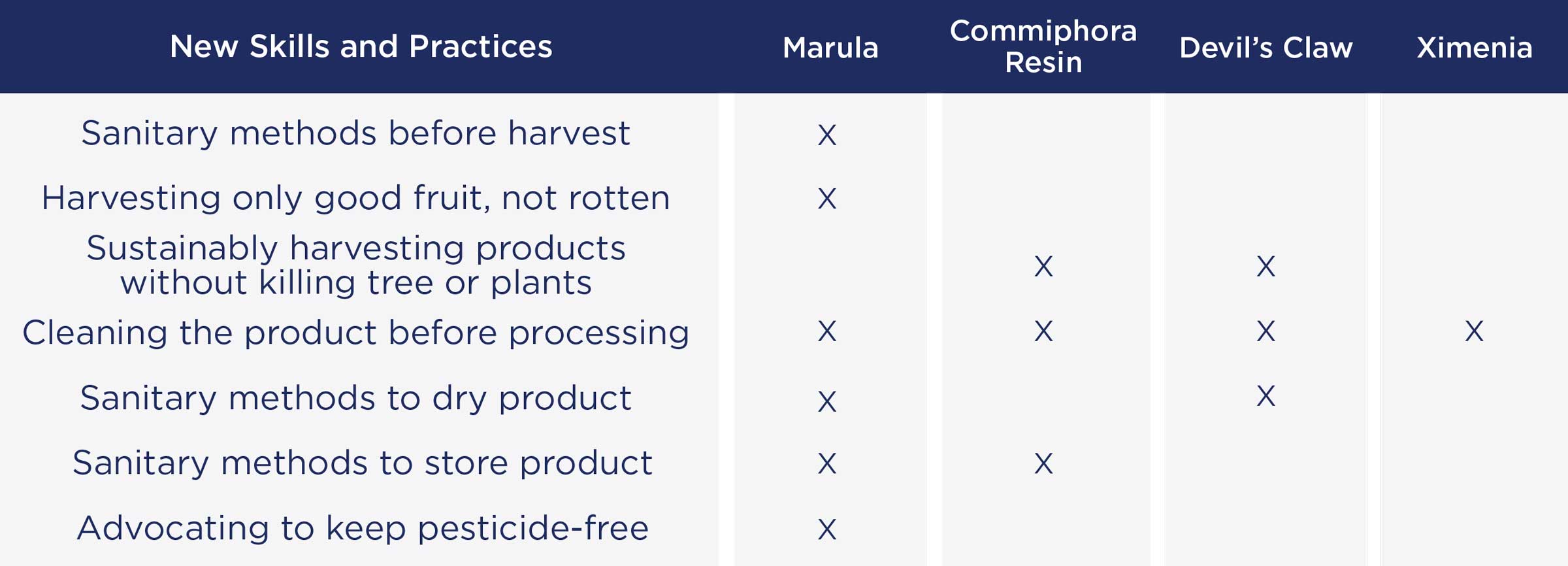
Quality, Quantity, and Sales of Products
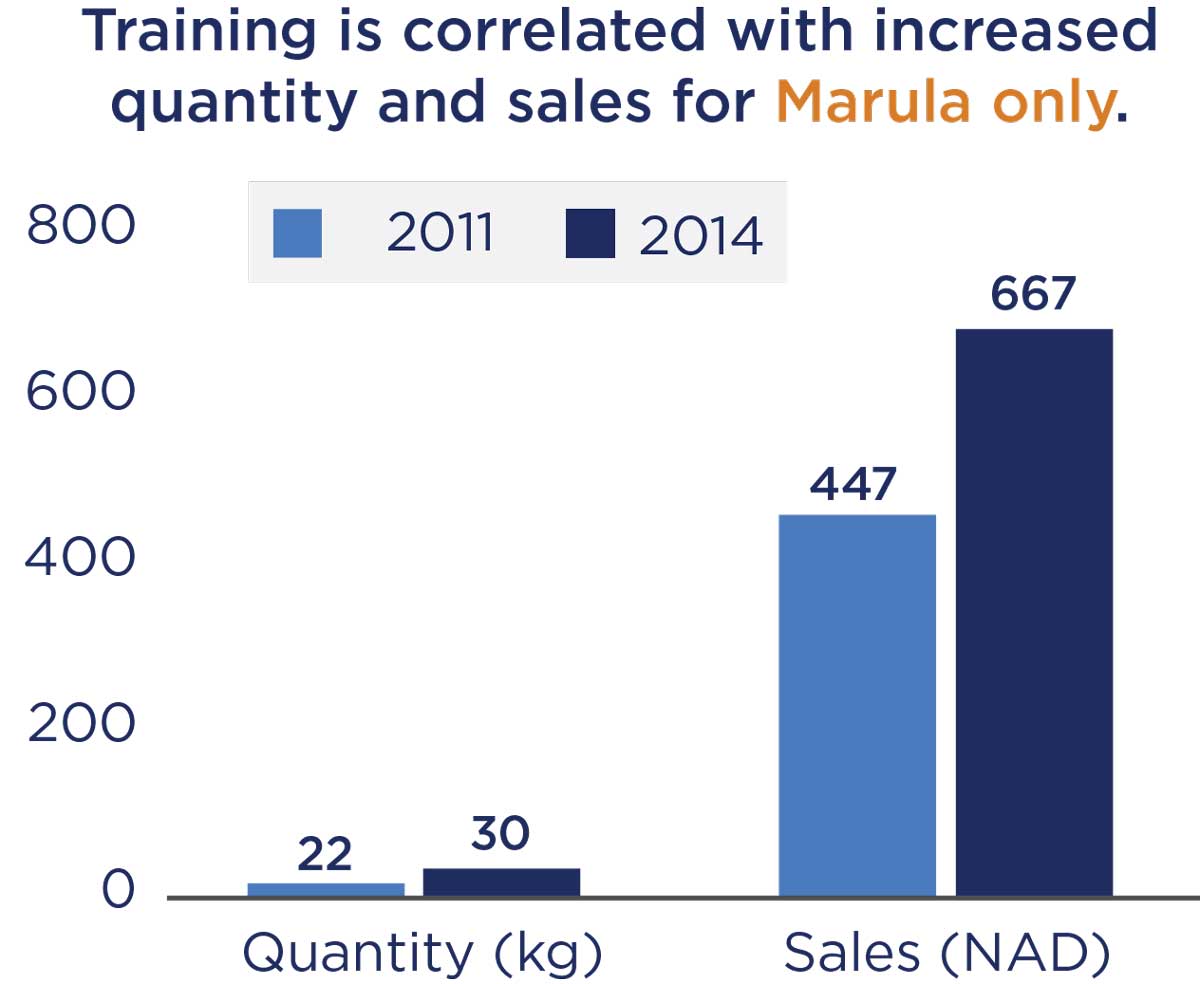
The training and support led to a reported increase in quality for all four supported products. However, the quantity harvested and sold increased for Marula only. From 2011 to 2014, harvests increased from 22kg to 30kg and sales increased by NAD 220. Marula harvesters reported the improved quality was reflected in the reduced quantity of returned or unpaid product. PPOs also improved the quality of Marula oil to the satisfaction of international customers by reducing pesticide and oxidation problems through improved post-harvest processes. For Devil’s Claw, qualitative data suggests training achieved a focus on quality over quantity, with larger and cleaner tubers harvested and sent for processing. For Ximenia, 2013 was a drought year, so it is unsurprising no increase was detected on quantity harvested or sold, but respondents believe quality improved. According to Commiphora harvesters, its use in cosmetics reflects increased quality.
Household Income and Sustainability
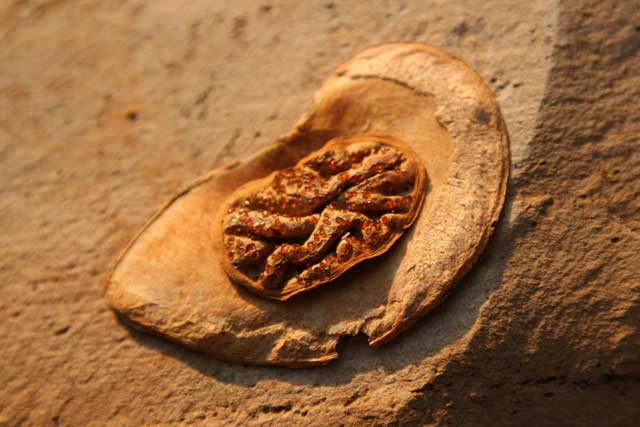
Mopane seeds.
Despite the increased quantity and sales of Marula, quantitative analysis indicates neither harvesters of Marula nor the other products reported increases in household income. This may be due to the fact that harvesting is a seasonal activity that yields low revenue and is insufficient to build assets. However, it is still considered an attractive supplemental income source for those who have other income-generating activities and for the unemployed, as well as women from marginalized populations. But sustainability is a challenge. The activity focused primarily on harvesters and PPOs which are on the supply side of the market, and a focus on marketing and increasing the demand side would have supported more sustainability of the sector.
MCC Learning
Balance supply and demand in future interventions that focus on production of agricultural or other goods, as getting the balance right is key for achieving and sustaining results.
MCC-funded evaluations need to follow MCC’s evaluation standards. MCC’s Evaluation Management Guidance was developed after this evaluation started. The guidance aims to ensure MCC funded evaluations are worth their costs and protect against some challenges encountered here including, for example, issuing evaluation contracts that fail to consider or require measuring key outcomes at appropriate times and collecting primary data for an evaluation before an evaluator has been contracted.
Evaluation Methods
Activities began implementation by November 2010, giving an exposure period of 0-42 months.
The performance evaluation uses pre-post methodology, relying on both qualitative and quantitative data collected in July 2011, July-August 2013, and May 2014:
- Quantitative analysis using household survey data collected on 300 harvester households in 2011 and 500 harvester households in 2014.
- 40 focus groups were conducted with members of PPOs across 2013 and 2014.
- 19 key informant interviews were conducted with implementing entities, private sector, and public sector across 2013 and 2014.
The evaluator notes that interpretation should consider the limitation of the samples. Out of 60 PPOs and five products, eight PPOs were represented at endline in the qualitative data and 18 PPOs are represented in the quantitative data for four of the five supported products. The evaluator cautions against generalizing results to all indigenous natural product PPOs and harvesters in Namibia.
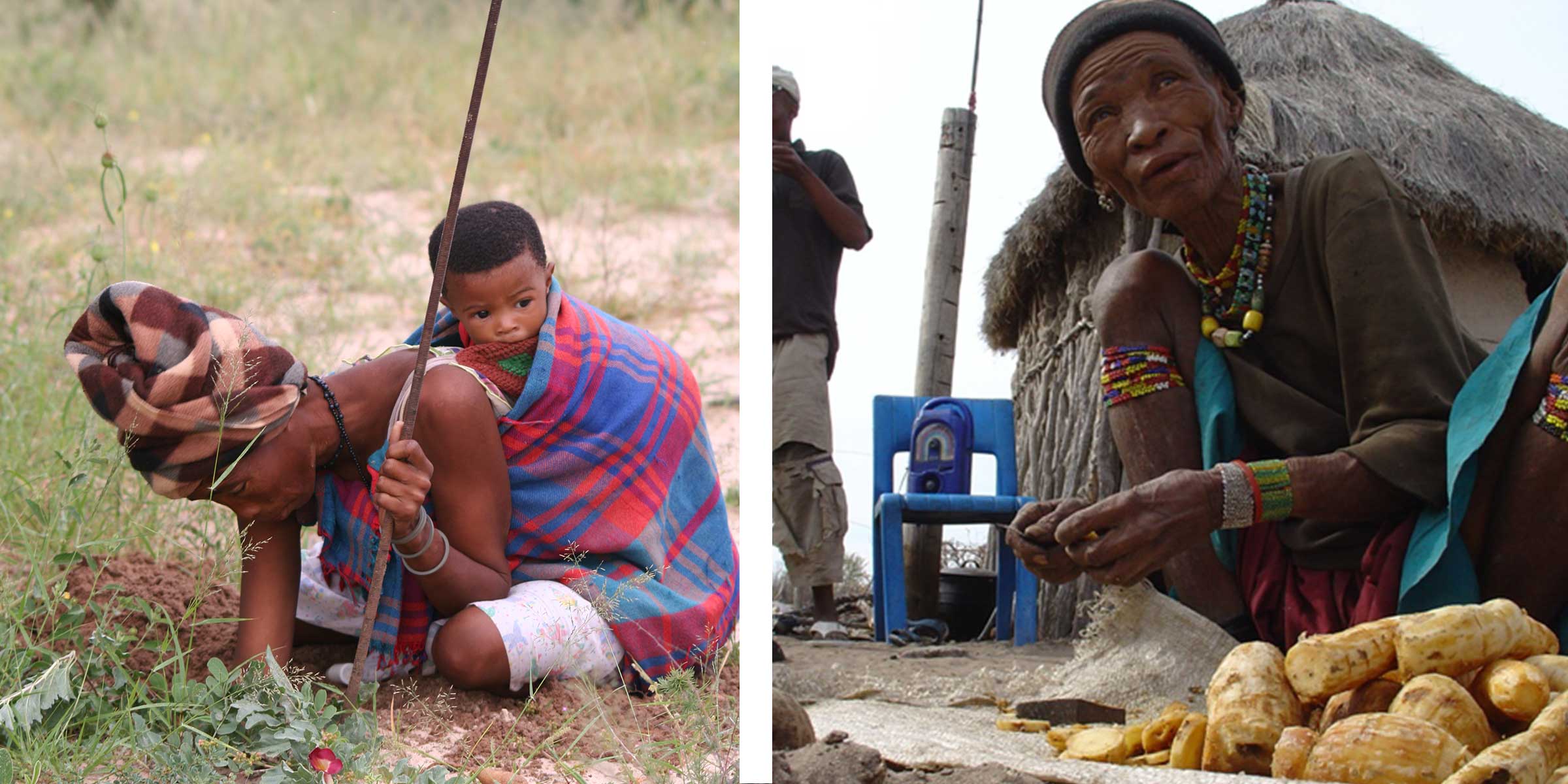
Sustainably Harvesting Devil’s Claw.
2020-002-2435


